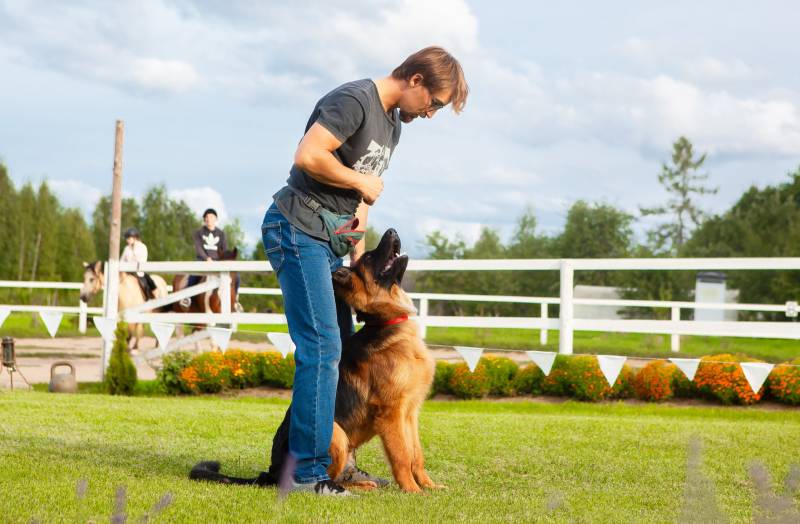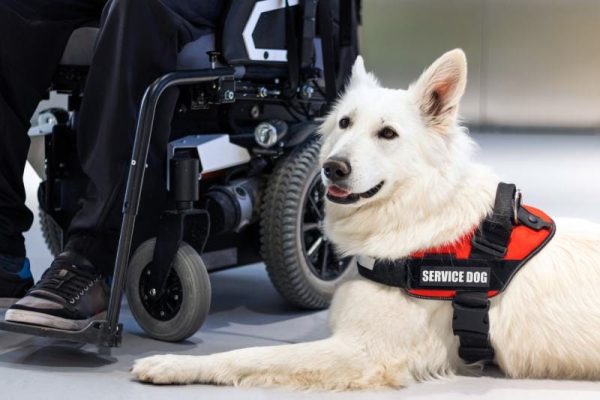In this article
German Shepherds are a vocal breed with a loud bark that can be extremely frightening for your neighbors, mail carrier, and delivery drivers to hear. You know your German Shepherd has the heart of an angel, but strangers only hear the bark and don’t know what’s behind the door.
Unnecessary and uncontrollable barking is not only scary for people who don’t know your dog, but it can be highly disruptive to both you and your neighbors. So, if you’re considering adopting a German Shepherd, you must be prepared for potentially problematic barking.
Keep reading to learn more about German Shepherds and their barking tendencies.

Why Do German Shepherds Bark So Much?
Barking is an important tool for German Shepherds. Working German Shepherds will be trained to bark when they sense drugs, danger, or anything else they need to alert their handlers about.
Your dog may not be a K9, but they will still be naturally inclined to bark a lot. There are many reasons your German Shepherds may be vocalizing. Some of these reasons include the following:
- Excitement
- Nerves
- Fear
- Age
- Boredom
- Territorial
- Hunger
- Pain
- Poor training

How to Stop Excessive Barking
Now that you know why your German Shepherd could be barking, let’s take a look at some of the dos and don’ts of discouraging excessive barking.
Do: Teach Your Dog the “Speak” Command
Though it might sound counterintuitive to teach your dog the command “speak” when you are trying to discourage barking, it is a great place to start.
Teaching your dog this command will help them understand the difference between “speak” and “quiet” before you’re in a situation when they’re stressed out and barking excessively.

Do: Learn Your Dog’s Body Language
Several body language cues are clear indicators your dog is about to bark. These include:
- Stiffened body
- Ears standing at attention
- Back and shoulder hair standing on end
- Attentive staring at the object or stranger that’s triggering them
Do: Use Positive Training to Desensitize
If your German Shepherd barks at strangers whenever you encounter them, a desensitization program can help discourage this behavior.
The key to this training method is using a high-value treat explicitly reserved for training sessions. We recommend something highly scented to grab your dog’s attention, like cheese or pieces of freshly cooked meat.
Move away from the stimulus when you see your dog displaying body language that suggests they’re about to bark. In this case, the trigger is a stranger. First, hold the high-value reward by your dog’s nose so they can smell and see it. Then, as they are looking at the treat, steer your dog away from the stimulus and give them the treat before they have a chance to bark.
Do: Ask Your Dog for a Barking-Incompatible Behavior
When your dog begins to bark, ask them to do an activity that is incompatible with barking. Teaching them to react to their barking triggers with something that inhibits them from barking is a great way to divert their attention.
For example, if someone is knocking at your door and your dog starts barking, throw a treat on their bed and tell them to go to bed. When they start understanding that going to bed earns them a treat, increase the challenge by opening the door while they’re on the bed. If they get up, close the door right away. Repeat this process until your dog learns to stay in bed when the door opens. Then, have someone ring the doorbell while your dog is in bed and provide a reward if they stay there instead of barking.

Do: Use Sight Barriers
Your German Shepherd can become territorial if they see or hear humans or other dogs outside. This could be why your dog is barking a lot at the living room window or the fence in your backyard.
The easiest way to prevent this behavior is to control the environment by blocking your dog’s view of things that will potentially trigger barking. For example, install privacy fencing in your yard, or leave the curtains closed. You can also limit your dog’s access to areas of your home where they can see strangers walking by.
Don’t: Use Harsh Discipline
Yelling at or hitting your dog to stop them from barking will do more harm than good. Your dog might already feel nervous or afraid, and raising your voice can add more stress.
Harsh punishments like shouting or hitting can increase aggressiveness in some dogs, so under no circumstances should you ever impose such discipline on your pet.
Shock collars may, over time, teach your dog not to bark, but at a significant cost. You’ll put your German Shepherd in great pain and discomfort, which may increase anxiety and aggression.
Don’t: Keep Your Dog Cooped Up Inside for Too Long
Your dog may be barking a lot because they’re bored and not getting the stimulation and exercise they need. Ensuring your German Shepherd has plenty of time to exercise can reduce attention-seeking behavior like barking.
Walking may not be enough exercise for your German Shepherd, so you might need to get creative with their physical activity. For example, take them for walks with other dogs so they will expend some energy playing. Take them for walks in hilly areas. Play fetch. Teach them to swim.

Don’t: Reward Attention-Seeking Behavior
If your German Shepherd is barking to get your attention, don’t reward this bad behavior by giving them what they want. Instead, ignore your dog while they’re barking and then reward them with attention when they have quieted down. This will reinforce that barking won’t get them what they want, but being quiet will.
Don’t: Try to Handle It on Your Own if It’s Overwhelming
If you have tried everything and can’t get your German Shepherd to stop barking, it might be time to call in the professionals. A certified trainer or veterinarian has a lot of experience dealing with this issue and can guide the best training techniques for your unique dog.
If you need to speak with a vet but can't get to one, head over to PangoVet. It's our online service where you can talk to a vet online and get the advice you need for your pet — all at an affordable price!

Don’t: Be Inconsistent
Consistency is key when it comes to training any dog. Daily rituals and consistent cues can help your German Shepherd understand appropriate and inappropriate behavior.
If multiple people in your household will be training your dog, ensure you’re all on the same page. Make consistent rules and stick to them.

Final Thoughts
German Shepherds are a vocal breed. While barking is a natural behavior and your German Shepherd’s way of communicating, it can become quite disruptive if it is not dealt with correctly and in a timely fashion.
If a German Shepherd is in your future, you must prepare for the sometimes rigorous training necessary to teach your new dog when it is appropriate and inappropriate to bark. Remember to be patient as you train your new dog, and never use harsh punishments.
Featured Image Credit: JumpStory



















